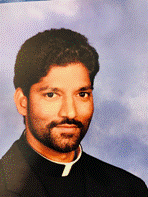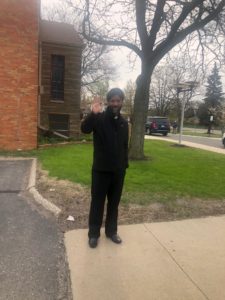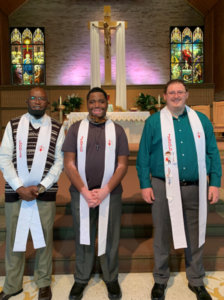“As you know our initial dispensation regarding Mass attendance is quickly coming to an end. In order to fashion a faith-filled response to the continuing crisis, cognizant of the legitimate concerns of the faithful to returning to a regular pattern of public worship, we would like to offer some general considerations as you teach about the centrality of the Church’s worship and our participation in it. We also want to communicate the importance of teaching about the need to keep holy the Lord’s Day.
“We have decided in the interest of the common good to extend the present dispensation for all through Christ the King Sunday. It seemed clear from the counsel received from our brothers that such a decision most aptly responded to the prevailing circumstances in our metropolitan area and in our parish communities. While this decision is a prudent and practical response to the present crisis, it is, nonetheless, a dramatic response and not lightly taken.”
“The Holy Sacrifice of the Mass is the very center of our identity as priests; we were made for the Eucharist. It is the identity of our people too, deputed for the task of sharing in the mission of evangelization; they find in the Eucharist the source of their zeal and strength (UTG, Marker 3.4). Helping our people keep this saving action as the engine of their missionary activity and at the forefront of their imagination is an absolute necessity and an incomparable gift that we can share especially at times such as these.”
“While we are prevented from gathering in person in varying measures, we must encourage the importance of making a spiritual communion and do so without also implying that it is an adequate substitute for our participation in the Holy Sacrifice as a gathered community of believers.”
“Keeping holy the Lord’s Day, something enshrined in the Decalogue and as divine law not dispensable, is the foundation of hope upon which we as a people build our lives. While our Sundays are different presently, it may be part of the Lord’s plan to use this pandemic as just one more way to draw us back to Himself and remind us of that perennial truth that without Him we can do nothing (cf. John 15:5). A holy people keeping a holy day is our goal, and in fact was at the heart of the directive regarding sports on Sundays. While every parish community is similar and every parish community unique, each of us must, with the assistance of our staff and advisors, offer ways in which our families, temporarily unable to come together, can continue none-the-less to carve out time for communion with the Lord particularly on the Lord’s Day. This includes scripture, prayers and meditation, and time for communion with each other. Thank you in advance, dear brothers, for your many efforts in assisting our people in walking the path of holiness, in being and becoming a eucharistic people, a people who keep the Lord’s Day perpetually alive in their hearts.”
“While this time is a time of testing, we pray that God uses this present crisis to whet our appetites for himself, for his eucharistic presence, so that we treasure anew our communion with one another, and once again make the foundation of our lives burn anew with eucharistic amazement.”
Fraternally in Christ,
Archbishop Allen H. Vigneron
Archbishop of Detroit
Most Reverend Arturo Cepeda
Most Reverend Gerard Battersby
Most Reverend Donald Hanchon
Most Reverend Robert Fisher
Fun Run Update
After careful consideration with our committee and Fr. Socorro we have made the decision to postpone our 15th Annual Fun Run Walk and Cookout. We thank our numerous donators, volunteers, walkers, and runners who have registered and sent generous donations. In the next week your checks/cash will be mailed to you. Please know you are deeply appreciated.
This is not the end of our Fun Run! We have set a Spring date of April 18, 2021 with hopes the Coronavirus won’t be compromising so many of our family and friends.
Until then, stay safe and stay healthy!
See you at the finish line in 2021!
Bonnie & John Danic
Patty & Jim Soter
Faith Formation News
Dear Families,
In the next few weeks you will be receiving an email or phone call regarding your child’s attendance this year. It is our hope to have the children in the classroom for their religious studies. We will maintain all the safety regulations set up by the Archdiocese of Detroit.
Our tentative start date is scheduled for Monday, October 5th. Your child’s tuition will be waived this year. The only cost will be $15 per child for books. If this a strain on your family budget, please let me know. Every child is welcome.
Feel free to call the office at 313-532-4394 x201 with any questions you may have.
Bonnie Danic

 (Thanks to Fr. Suresh for his willingness to accommodate me) and I remember very well that first night I spent here at St. Valentine. I was invited to the Entrée with Padre dinner with men of the parish. It was an enjoyable evening with foods I had never eaten before! I stayed at St. Valentine until June 2013. Ever since, St. Valentine Parish has been a home away from home for me. I will always feel at home here at St. Valentine. My initial stay here with you was a great learning experience. You were amazing and very welcoming. When I received a call from the Archdiocese to move to St. Valentine, I was so happy to come here and spread the love of God.
(Thanks to Fr. Suresh for his willingness to accommodate me) and I remember very well that first night I spent here at St. Valentine. I was invited to the Entrée with Padre dinner with men of the parish. It was an enjoyable evening with foods I had never eaten before! I stayed at St. Valentine until June 2013. Ever since, St. Valentine Parish has been a home away from home for me. I will always feel at home here at St. Valentine. My initial stay here with you was a great learning experience. You were amazing and very welcoming. When I received a call from the Archdiocese to move to St. Valentine, I was so happy to come here and spread the love of God.
 On June 14th at the 9 am Mass three of our six Catechumens were brought into the Catholic Church. We congratulate Louis Martin, Jo’Van Martin and Jacob Frankmann. Louis and Jacob went thru the RCIA program held on Thursday evenings and Ja’von was instructed thru our School. We welcome these 3 fine gentlemen. Please be sure to send your
On June 14th at the 9 am Mass three of our six Catechumens were brought into the Catholic Church. We congratulate Louis Martin, Jo’Van Martin and Jacob Frankmann. Louis and Jacob went thru the RCIA program held on Thursday evenings and Ja’von was instructed thru our School. We welcome these 3 fine gentlemen. Please be sure to send your